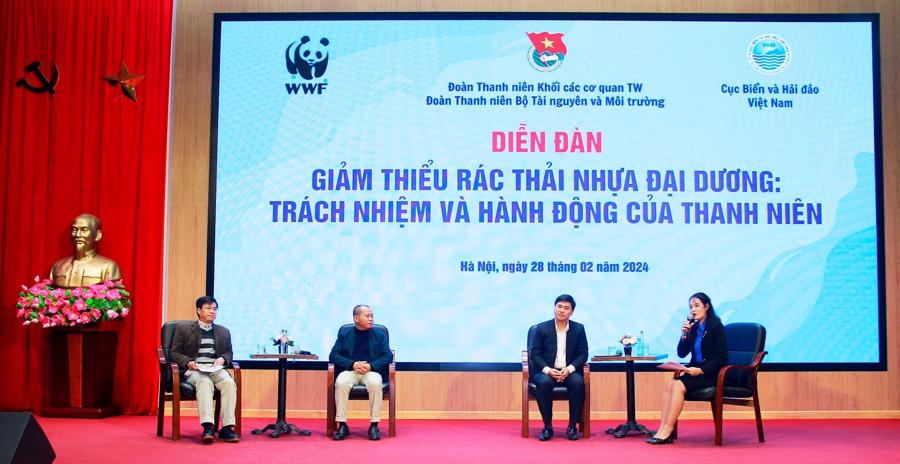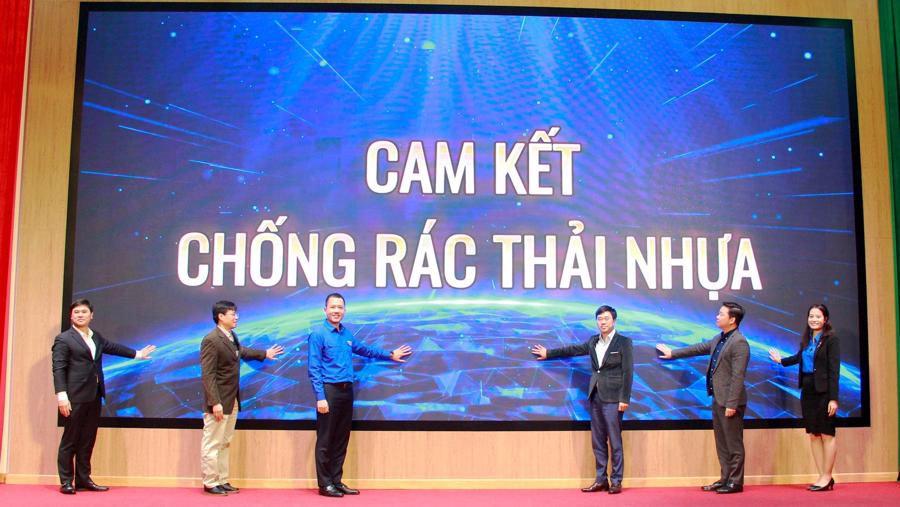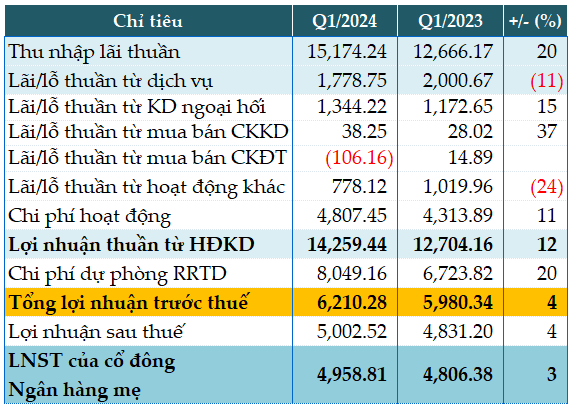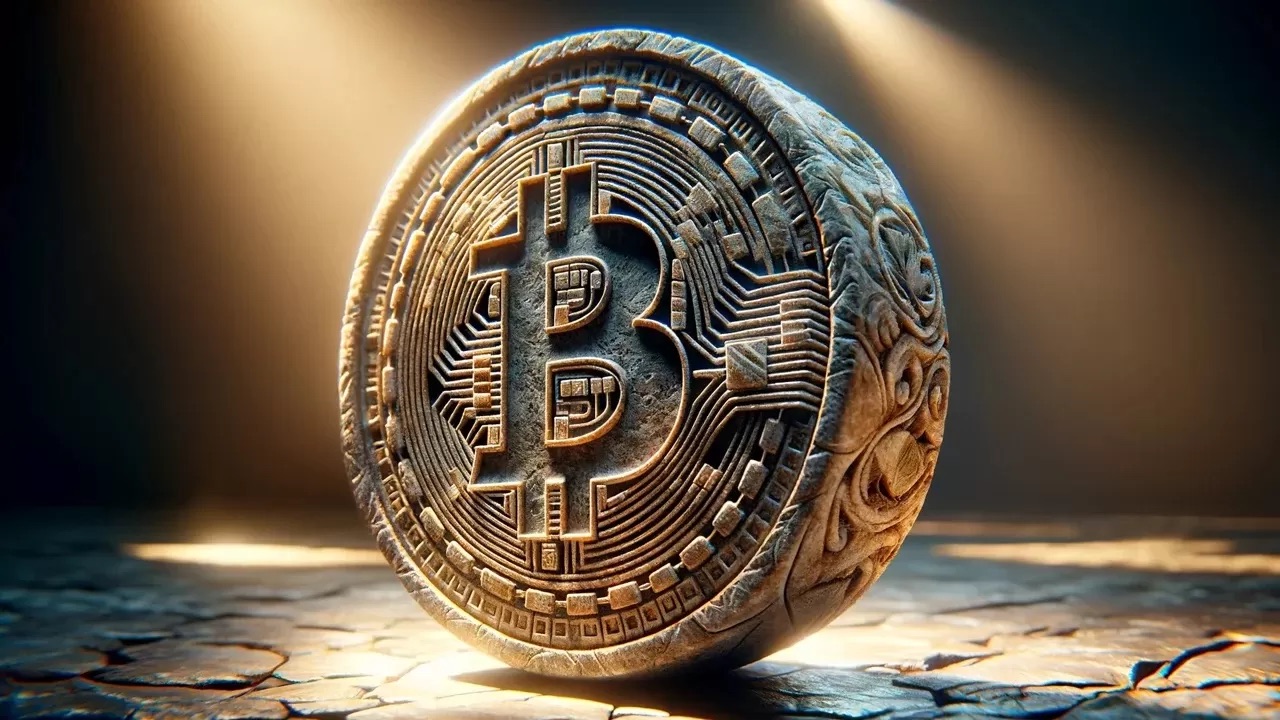This situation was pointed out by the Environmental Pollution Control Agency of the Ministry of Natural Resources and Environment at the forum “Reducing Plastic Waste in the Ocean: Responsibility and Action for Youth” organized by the World Wide Fund for Nature in Vietnam (WWF Vietnam), the Vietnam Marine and Island Department, and the Ho Chi Minh Communist Youth Union of the Ministry of Natural Resources and Environment on February 28, 2024. The forum aims to call for concrete actions, behavior changes, and habits in the use of single-use plastic products, including non-biodegradable plastic bags.
THE AMOUNT OF PLASTIC WASTE ENTERING THE ENVIRONMENT IS SIGNIFICANT AND INCREASING DAILY
According to statistics from the Ministry of Natural Resources and Environment, Vietnam discharges about 1.8 million tons of plastic waste into the environment each year, of which 0.28-0.73 million tons are discharged into the sea, but only 27% of this is recycled and utilized by establishments and businesses.
It is noteworthy that the treatment and recycling of plastic waste are still limited, as up to 90% of plastic waste is treated through burial, landfilling, and incineration, with only 10% being recycled.
According to a representative of the Youth Union of the Environmental Pollution Control Agency, Vietnam is facing many risks from plastic waste, with an average of 1 kg of plastic bags per month used by each household. In particular, the two major cities of Hanoi and Ho Chi Minh City discharge about 80 tons of plastic waste and plastic bags into the environment on average every day.

Meanwhile, the sorting, collection, recycling, and treatment of plastic waste still face limitations. The amount of plastic waste and plastic bags in Vietnam accounts for about 8-12% of solid waste. However, only about 11-12% of the plastic waste and bags are treated and recycled, while the rest is mainly buried, incinerated, or discharged into the environment. This can lead to environmental disasters and ocean pollution.
Every day, about 22 tons of plastic waste are discharged from medical activities, including hazardous waste (medicine, chemicals, etc.). The collection, recycling, and landfilling of this type of plastic waste all affect community health and environmental pollution,” warned a representative of the Youth Union of the Environmental Pollution Control Agency.
Sharing about the situation of plastic waste pollution in Vietnam, Mr. Hoang Duc Vuong, Chairman of the Recycled Plastics Association of the Vietnam Plastics Association, highlighted the reality that in 2023, Vietnam imported about 7.5 million tons of plastic pellets, while domestic production reached over 2 million tons. Thus, the annual raw material for producing virgin plastic in Vietnam is about 10 million tons. This is a very large number,” said Mr. Vuong.
In recent years, plastic consumption in Vietnam has been continuously increasing at a rate of about 15% per year. Currently, the total output of the plastics industry is about 25 billion USD, with exports reaching about 4.5 billion USD in 2023.
According to Mr. Vuong, with the strong consumption volume, the amount of plastic waste entering the environment is significant and increasing daily. This plastic waste includes a part (valuable plastic) that is being collected and recycled in craft villages nationwide. However, there is still a large amount of difficult-to-recycle plastic waste with low value, such as packaging, single-use plastic bags, etc., that is not recycled but dumped in landfills or directly discharged into the environment.
It is estimated that Vietnam consumes about 6.2 million tons of plastic annually. This also means that a large amount of plastic waste needs to be treated.
CHANGING THE BEHAVIOR AND ATTITUDE OF THE COMMUNITY AND BUSINESSES TOWARDS PLASTIC PRODUCTS AND PLASTIC WASTE
It can be seen that the problem of plastic pollution in Vietnam is increasing rapidly, creating major challenges in environmental management and requiring cooperation and efforts from all levels of society to face and solve this problem. The issue of plastic waste is becoming more and more serious in Vietnam. If we do not have effective and timely solutions, the negative impacts of plastic waste will become very serious.
Secretary of the Youth Union of the Ministry of Natural Resources and Environment Dang Quoc Khanh emphasized that plastic waste pollution, especially marine plastic waste pollution, has become an urgent global issue. Minimizing waste from plastic and nylon is an urgent requirement, starting with reducing the consumption of single-use plastic and nylon products.
The United Nations has launched the theme “Addressing Plastic and Nylon Pollution” to call on everyone to change their habits in using single-use plastic products, thereby reducing environmental pollution and protecting human health.

Plastic waste pollution is a cross-border and regional issue. Solving this problem requires the participation of all levels, sectors, socio-political organizations, businesses, and individual Vietnamese citizens in the collective efforts of the region and the world,” emphasized Secretary of the Youth Union of the Ministry of Natural Resources and Environment.
According to the Environmental Pollution Control Agency, reducing plastic waste requires comprehensive solutions. Strengthening communication and raising awareness is a key factor. Behavior changes and attitudes of the community and businesses towards plastic products and plastic waste need to be changed.
In recent years, environmental protection activities have emerged strongly and vibrant in the Vietnamese youth community. Through specific actions and practical models, youth members have not only become strong warriors but also active individuals, highlighting their roles in the common journey to fight against the serious challenge of plastic waste.
It is worth noting that to reduce plastic waste, solutions need to be implemented in a comprehensive and effective manner. Strengthening communication and raising awareness is an important foundation. Changing the behavior and attitudes of the community and businesses towards plastic products and plastic waste is crucial. Small actions such as limiting the use of plastic bags, using glass bottles instead of plastic ones, prioritizing the purchase of paper packaging instead of plastic ones, etc., will contribute positively to the fight against plastic waste.
According to Mr. Vuong, the issue of combating plastic waste in Vietnam is still in its early stages and faces many difficulties and limitations. Therefore, it is necessary to closely follow the reality to build suitable policies for effective plastic waste reduction.
He emphasized the importance of green economic development and circular economy, stating that in recent years, he has made many policy recommendations to develop and promote the circular economy of plastic waste in Vietnam. Some policies have been applied, such as expanding the extended producer responsibility (EPR).
With EPR, producers and importers are responsible for collecting, treating, and recycling the products they produce or import. The products include consumer products, paper packaging, plastic packaging, electrical and electronic equipment, automobiles, batteries, and accumulators… This is the key to opening the door to recycling, helping the circular economy move forward.
Especially, to combat plastic waste, the first important thing is to extend the life cycle of plastic products and minimize waste released into the environment. To achieve this, standards for plastic products are needed,” emphasized Mr. Vuong.









































